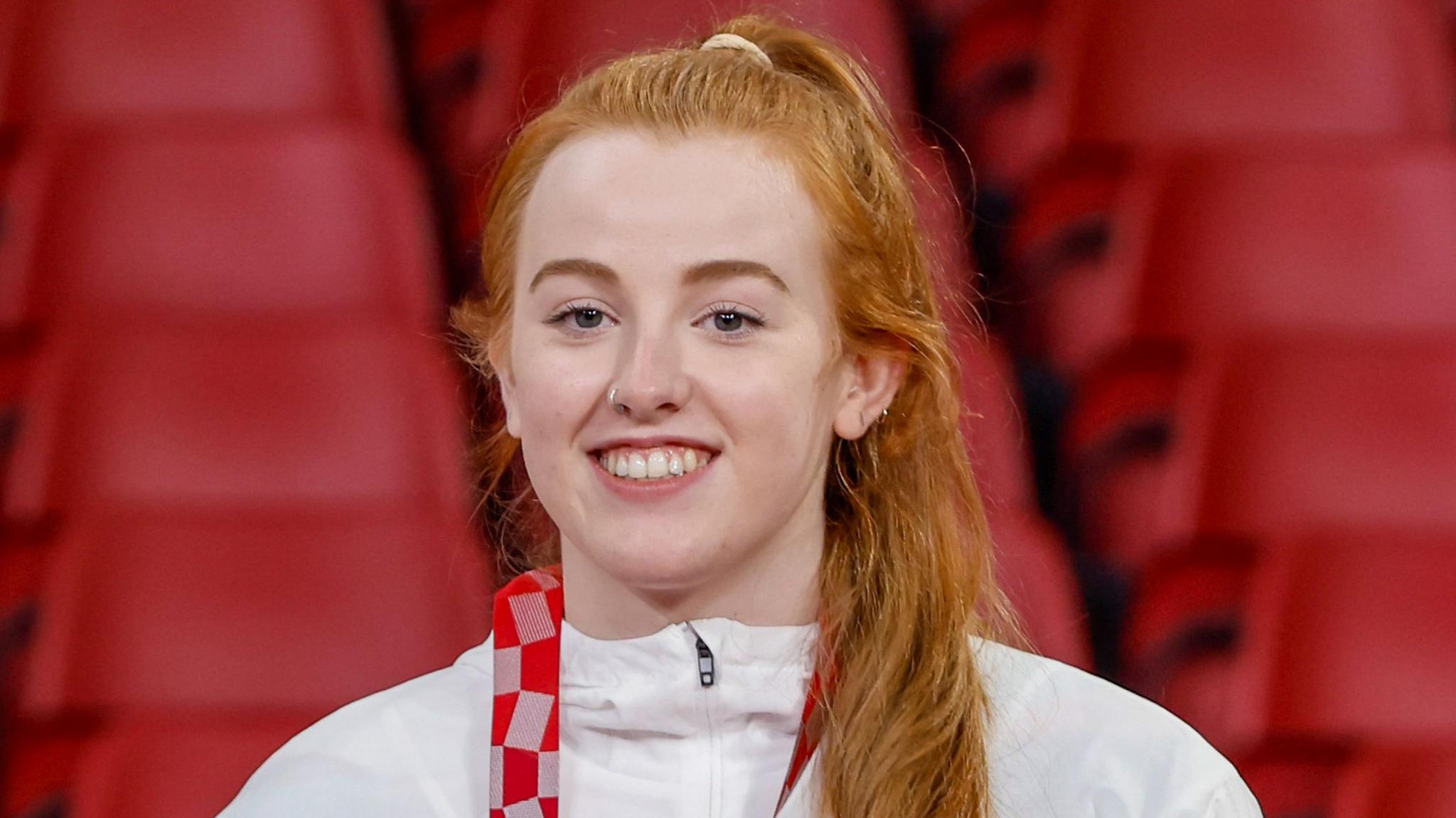Schoolmates and bridesmaids battle for Paralympic gold
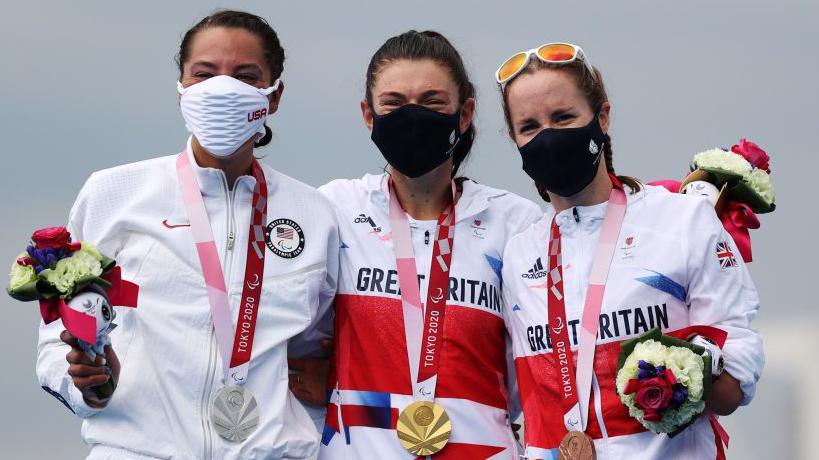
(Left to right): Grace Norman, Lauren Steadman and Claire Cashmore were on the podium in the women's PTS5 triathlon at Tokyo 2020
- Published
Lauren Steadman and Claire Cashmore first met 18 years ago, and their lives and careers have been entwined ever since.
They were students together at Kelly College - a private boarding school in Devon - before becoming swimmers and competing at the Paralympics for Britain.
Both later transitioned into triathlon, were on the podium together at the Covid-delayed Games in Tokyo, and will once again fight for gold in the Paris Paralympics this summer.
It is a rivalry which has extended across the years - but, according to Steadman, is one that is friendly, even familial.
"She is like a big sister to me," Steadman told BBC Sport. "I met her when I was 13, and I said to my dad: 'I want to be Claire Cashmore.'
"Off the field we are very close. I never want her to have a bad race. I don't want to beat someone when they are down.
"If we are leading the way forward, then who better to push boundaries with than my own team-mate. We can use each other to be the best in the world."
That drive to be the best was born at Kelly College - now known as Mount Kelly, which has produced a remarkable number of Olympians and Paralympians, particularly swimmers.
Along with Cashmore and Steadman, Paralympic gold medal-winning swimmers Hannah Russell and Michael Jones also attended the boarding school in Tavistock, as did British Olympians Sharron Davies, Andy Jameson and Robin Brew.
As well as sharing an alma mater, Cashmore and 31-year-old Steadman also have a similar disability - one missing forearm - which means they compete in the same Para-triathlon category, PTS5.
While they race against one another, Cashmore - who is five years the senior of Steadman - says they rarely interact outside of the blue carpet, despite her team-mate's description of a sisterly relationship.
"Lauren and myself don't train together, we only see each other at competitions and training camps,” she told BBC Sport. “It keeps you on your toes to know there are girls who are constantly pushing and breaking down those barriers to be better, so you have to make sure you are doing everything you can as well.
"I love racing against other people who are constantly pushing me to be better. It is what keeps me motivated, setting goals each day. If it was a walk in the park, I wouldn't have that same drive every day. I love to be pushed, see the other girls doing well and keep pushing boundaries."
MacCombe twins relishing 'amazing' Paralympics debut
- Published27 August 2024
'They are not going to be best friends - and that's OK'
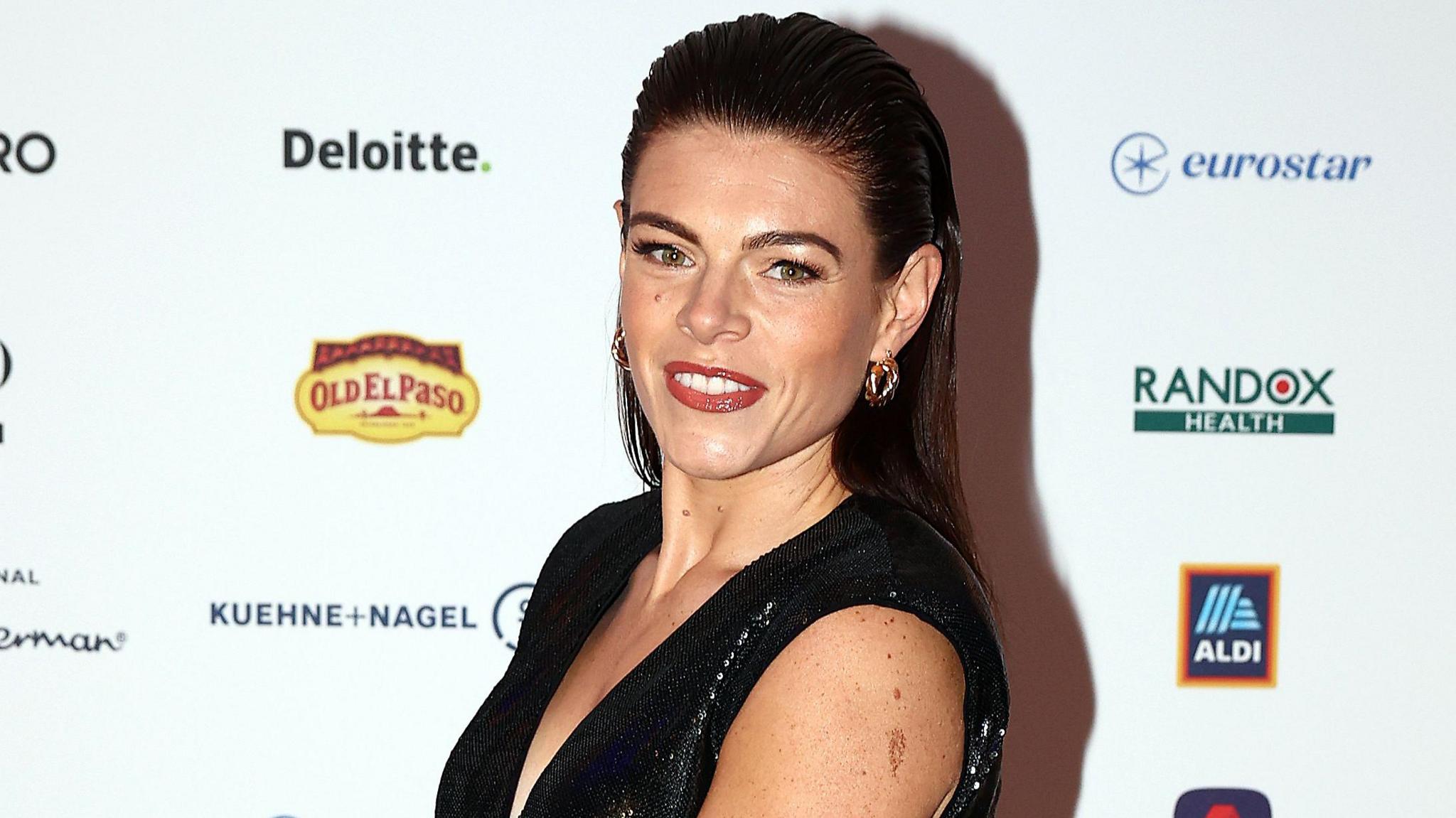
Lauren Steadman has gained a profile as one of Britain's best known Paralympians following a series of reality television appearances
While Cashmore is less effusive about her relationship with Steadman, that is less to do with rivalry and more about her seniority, according to former team-mate Rachael Latham.
Latham knows both women well, having swum with Steadman at the 2008 Paralympics and with Cashmore at World Championships. Now retired, she remains friends with both.
"Claire is the older athlete and more reserved - at one point, Claire was Lauren's role model,” Latham told BBC Sport. “Now Lauren is a champion and Claire is chasing that dream.
“Lauren will always view Claire as that mentor, the first person who did that, 'I want to be like that too'. She is always more likely to be publicly open about someone she admires and likes.
"Claire had been to the Games, achieved things Lauren hadn't. I guarantee one of the things Lauren would have said at the start of her career is: 'I've met Claire Cashmore, she is amazing.' Now the relationship has shifted. When they are going for the same goal, they are not going to be best friends. And that's OK."
The most high-profile race between Cashmore and Steadman came in Tokyo three years ago - although it was several Paralympic cycles in the making.
Paris 2024 will be Cashmore's sixth Games and Steadman's fifth. For Cashmore, the first four came as part of the ParalympicsGB swimming team with the pinnacle being gold as part of the women's 4x100m team at Rio 2016.
But after growing disillusioned with swimming, Cashmore chose to transition to triathlon, which had made its Paralympic debut in Rio, where Steadman won silver in the PT4 category.
Steadman had swum for GB in the 2008 and 2012 Games, before moving into her stronger discipline.
So, in front of zero spectators in the Japanese capital because of Covid, Steadman and Cashmore met on the Paralympic stage.
'I messaged her three days ago about my new nails'
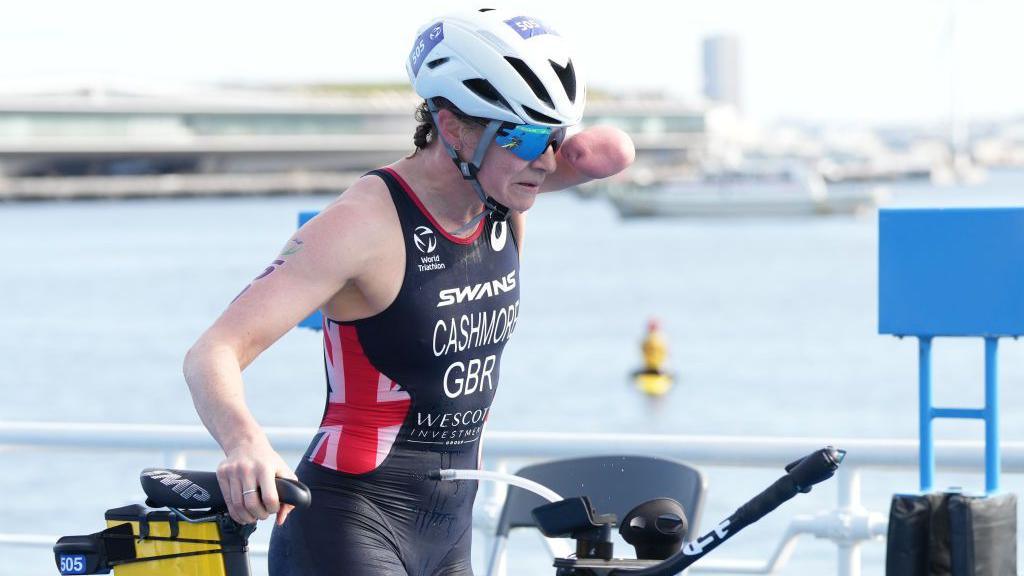
Claire Cashmore has won a series of titles, including back-to-back European crowns, since the last Olympics
In a dramatic race, Steadman took gold after taking the lead during the cycling section, extending her lead at the end during the run.
Cashmore came third after being given a one-minute penalty for a "drafting violation" - entering the slipstream of a racer in front, without intending to overtake.
There was confusion as race officials initially got the penalty duration wrong, leaving Cashmore frustrated and settling for bronze.
Silver went to American Grace Norman, who completes the fascinating triangle of relationships in the PTS5 category.
Norman, 26, and Steadman are close friends - to the extent Steadman was a bridesmaid at Norman's wedding – and it is not a friendship which is put on hold even in the build-up to a Paralympics.
"I messaged her three days ago about my new nails," Steadman said when speaking to BBC Sport in July. "Grace likes to do a lot of things in her down time, like arts and crafts, so I’m often messaging her about that.
"We are always checking in. Even if we are arch-enemies in the race, we check in. Although we try to be more respectful in the build-up to a race, to give each other space.
"When I was younger, Grace was a threat. But now we are older, I have learned to have respect for the people I race with. I want everyone to bring their A-game. I always say to her before a race, 'good luck', but in the race we fly the flag for our country."
This is symbolic of rivalry in Paralympic sport, says Latham - it burns bright and fierce, but is borne of a mutual respect and empathy unlike anything in the Olympics.
"Young Paralympians may not have met a disabled person before," she said. "You bond over these things which have higher value to you. They respect each other as athletes, but it is more than just sport.
"Claire taught me how to do my hair with one hand, for example."
'Claire is absolutely proud of Lauren'
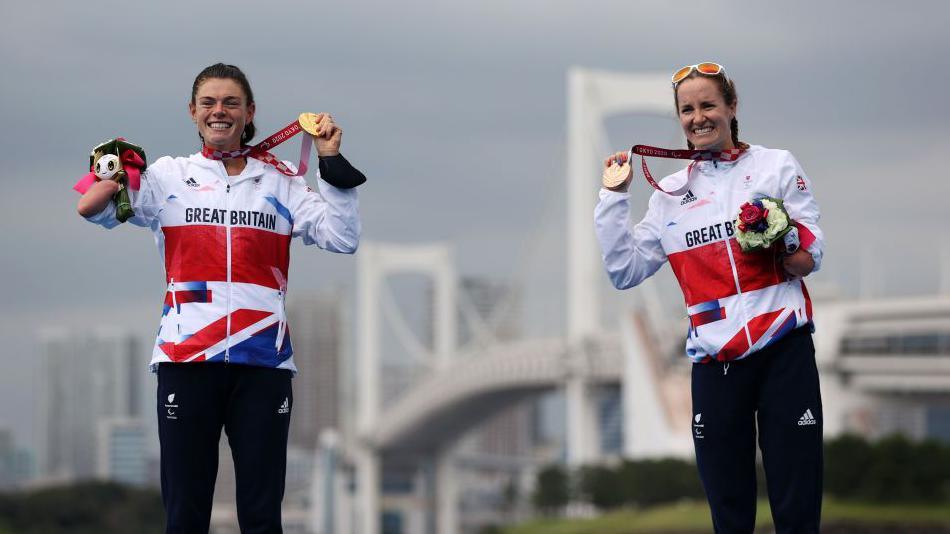
Steadman and Cashmore shared the podium in Tokyo and will aim for a similar outcome in Paris
To Paris, where the PTS5 field looks strong again - and the usual suspects are contending for gold.
Cashmore and Norman are first and second respectively in the world rankings. The Briton is the in-form triathlete with three wins in world events so far in 2024. Cashmore has also won the past three European Championships.
For Cashmore, it is about redemption and learning from the mistake which disrupted her so badly in 2021 - in what was a particularly traumatic Games not only for her, but for her partner and fellow ParalympicsGB triathlete Dave Ellis, whose medal hopes were ended by a bike-chain failure.
Steadman's build-up has been much less smooth. She has fallen to 11th in the world rankings following a two-year break from triathlon, during which time she took up training in cross-country skiing with a view to a potential bid for the Winter Paralympics in 2026.
Her preparations have also been severely disrupted by testing positive for Covid in March, which left her unable to compete at full capacity for months.
Steadman is looking to use all her experience and nous to deal with multiple pressures - quality opposition, her own health, her status as reigning Paralympic champion, and being one of the most recognisable names in the ParalympicsGB squad from her numerous TV endeavours, including Strictly Come Dancing in 2018.
So two Britons competing for gold, at the same time so similar and so different. But if either or neither tops the podium, says Latham, there will be no animosity.
"Claire is absolutely proud of Lauren, and proud of her career," she said.
"Lauren is doing everything Claire aligns with - she puts herself out there, on social media, she is a household name, and she is trying to be the best triathlete in the world.
"If she doesn't get gold, Claire will be devastated but she will not be bitter at Lauren."
The Kidderminster athlete, who trains at Loughborough, has swapped the pool for 3 sports.
Related topics
- Published31 July 2024
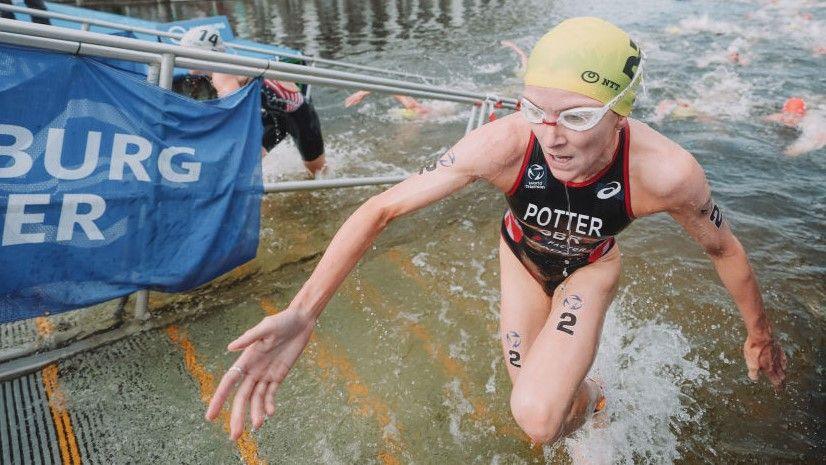
- Published23 July 2024
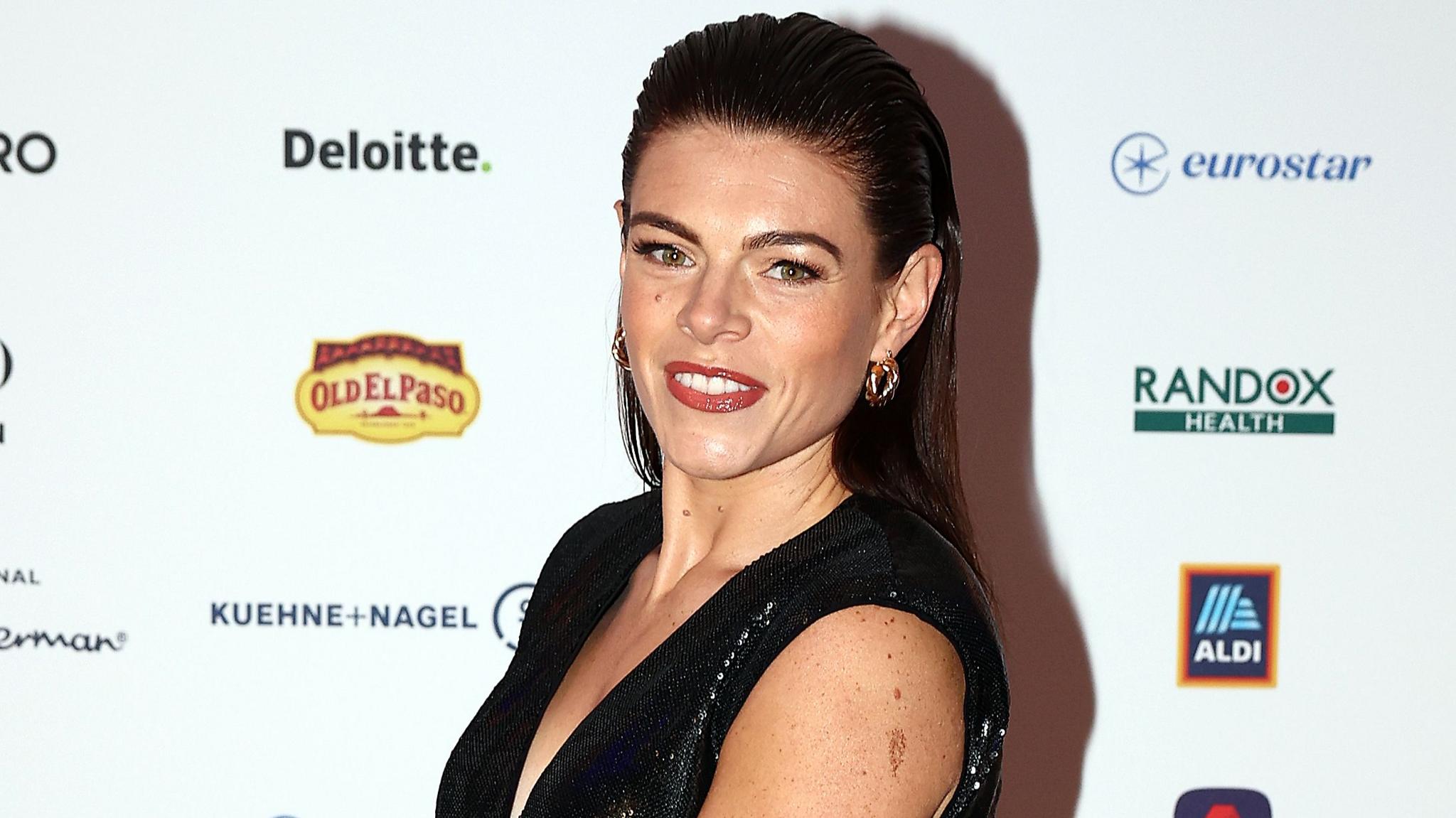
- Published17 July 2024
